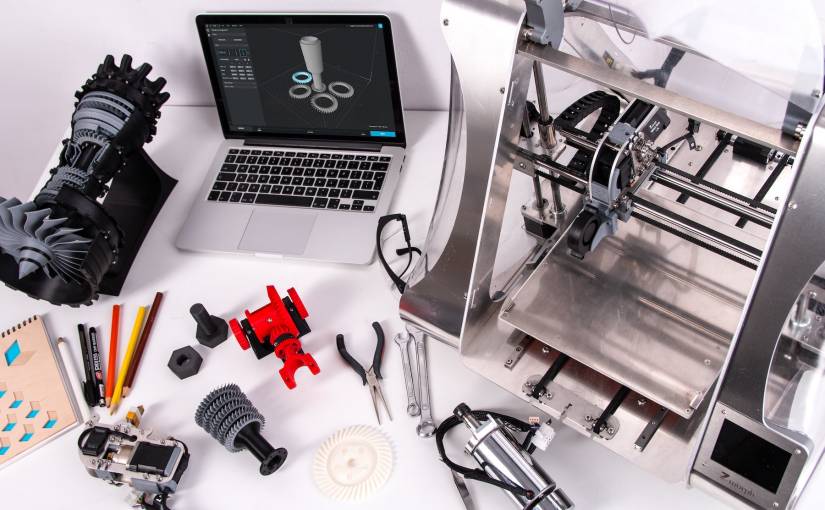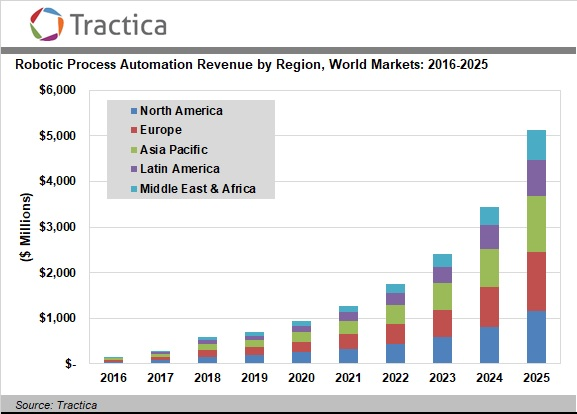Automation has evolved to become essential in the composition of startups worldwide. Every ambitious company from Seoul to San Diego is now looking to automate their operations as a means of fending off competition and staying competitive.
Robotic process automation (RPA) has been identified by many entrepreneurs as an essential tool in optimizing business processes in a cost-effective manner. Tractica has estimated that the RPA market will see revenues of over $5bn by 2025.
(Tractica reporting suggests that global RPA revenue will top $5bn by 2025. Image: Tractica)
The future is clearly bright for RPA technology and startups looking to manage large volumes of data without committing too much time and money to the challenge. The significance of automation is that it can accelerate the growth of small businesses in a way that wasn’t possible before. Here’s a deeper look into the revolutionary influence that RPA is having over fledgling businesses:
Intelligent Data Processing
Many startups and project managers are capable of accessing large swathes of information but don’t possess the kind of technology that helps them to make real use of it. However, RPA helps users to access varied and extensive use cases from the data they obtain. RPA is a form of data management that can ultimately prove essential in helping businesses to strategically grow from their formative months and years.
Process mining can aid companies in gaining a stronger understanding of the processes involved in the actions that RPA undertakes. When something is automated using RPA, it’s possible to break it down into component parts and the various stages involved while finding areas in which to practice more efficiently and time management.
Process Simulations
Process simulations help users to supply information into a computer before letting it complete a prospective task. This form of hypothetical automation can allow you to calculate and re-calculate how best to approach tasks and see which method brings the most efficiency for your startup without having to focus time and effort on actually undertaking it.
Process simulations are an excellent way for startups and project managers to figure out the most effective way of operating and possibly even change existing setups on the fly – should it be deemed necessary.
The Next Generation of Data Management
RPA is highly useful when it comes to the storing of data, and has the potential to bring efficiency to data cleansing, normalization, data wrangling, and the creation or updating of metadata.
Many startups are required to indulge in some form of data entry throughout their respective lifespans. When data entry is conducted by human hands, the repetitive tasks carry a relatively high rate of error compared to automated alternatives.
By utilizing RPA to manage data entry, it’s possible to automatically screen for errors and irregularities within datasets, move data between different storage systems and eradicate duplicated metadata among other tasks.
By utilizing RPA solutions, it’s possible to make your data go further. It’s also possible to simulate tasks in a way that can help you to effectively A/B test your processes to keep ahead of your early competitors.
Easy Efficiency
Using RPA is an effective way of boosting productivity within your workplace. The beauty of RPA solutions is that they require very little technical understanding from users in order to utilize them effectively. Simply speaking, the software follows the instructions of the user and automates its given tasks. This makes it relatively straightforward to replicate the repetitive tasks involved in data entry and the addition of metadata for startups to focus employee energy on other vital tasks.
It’s important for startups to respect the resources available to them and use them in an efficient manner. The implementation of RPA into a startup enables business owners to reallocate staff in order to tend to more pressing matters, due to their workloads being free from repetitive tasks.
Reallocations also allow staff to take more time in their work, creating more creative solutions, and applying more care to the process of undertaking more complex business tasks.
Regardless of how you decide to implement RPA, your team would need to be a big part of the process involved. The reason behind this is that they will already possess a fundamental understanding of said processes and will likely be skilled in finding the most efficient ways in which RPA can undertake work.
Once your RPA system is in place, it’s vital that you use your new resources to their full potential. For instance, you could use the technology to provide support to a section of your startup that’s understaffed, or forecast to require more output in order to support the business’ growth.
Here, it’s vital to remember that automation will only provide users with efficiency and cost-effective processes by allocating the technology to the right areas of your organization.
Automation to Bring Employee Empowerment
The early life of a startup can be a delicate and tentative time for business owners. There are plenty of ways to access funding and prepare your endeavor for its entry onto the market. However, small businesses with fewer employees face a constant challenge in ensuring that all workers remain motivated and committed to the startup.
While automation can help to make employees more efficient, some business owners may be fearful of utilizing automation in the workplace due to the level of disruption it may cause.
However, studies from HR Technologist have shown that 92% of organizations have seen employments in employee satisfaction levels as a result of intelligent automation and robotic process initiatives.
While some employees are perceived to be fearful of automation, reports suggest that the removal of manual and time-consuming workloads aids workers in focussing on more engaging activities.
Increasing the time employees spend on more rewarding and engaging workloads also helps them to increase their motivation for tasks. This can be a key factor in ensuring workers communicate effectively with customers and optimize their own output in a way that helps startups to establish themselves faster during those tentative early months.
Ensuring that your approach to automation efforts keep your employees happy in their line of work is more important than a lot of business owners may know.
The most effective work will often come from contented employees, and it’s important to utilize RPA in a way that gets rid of the workloads that your employees are least engaged in. In doing this, it’s possible to have a positive effect on worker attitudes and your startup’s overall performance.
Employees that approach their work in a positive mindset can help to reduce the costs of staff turnover and the impact of HR tasks associated with recruitment and training.
The early days of a startup are the most important in its lifespan. By failing to optimize your operations, it could cost your business valuable working hours and damage the satisfaction levels of both your employees and customers.
While embracing automation may cost money to set up, it can work wonders in saving money across various other departments – especially when it comes to recruitment and manual tasks. In a competitive landscape that often treats new businesses harshly, RPA can help startups to attain a fighting chance of survival where hope may otherwise be lost.



















